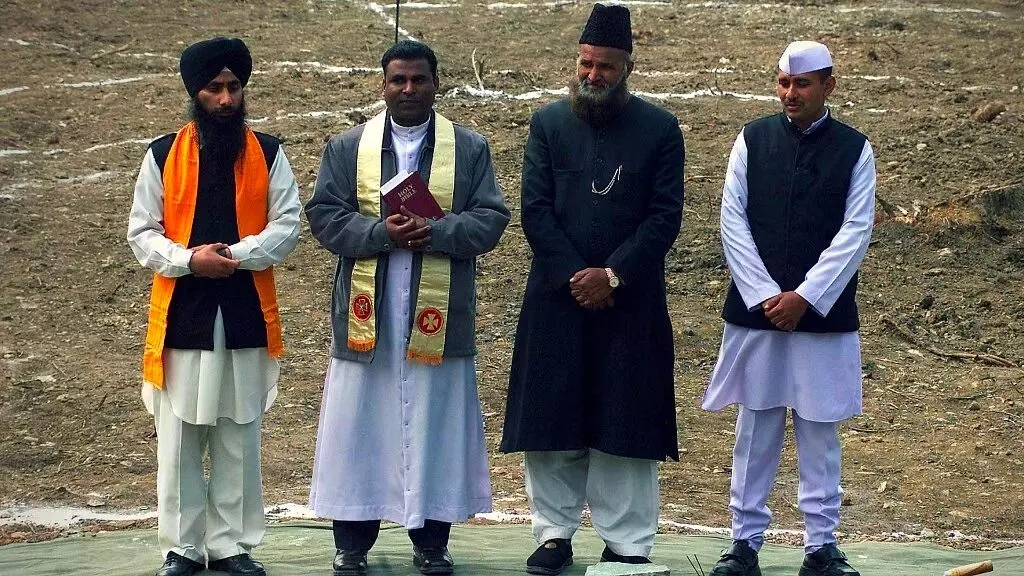Uniform Civil Code: Tehreek Muslim Shabban to meet political parties, voice opposition
Addressing the gathering, Mushtaq Malik, President of Tehreek Muslim Shabban, stated that the government is stereotyping Muslims.
By Syed Khaled Shahbaaz
Hyderabad: Social and political activists urged the Muslim community to unite against Uniform Civil Code (UCC).
Interacting during an all-party roundtable meeting organized by Tehreek Muslim Shabban at Media Plus Auditorium, they called Muslim organizations and other civil society groups to set aside their differences and join forces in opposing the UCC.
During the meeting, the participants emphasized the need to express solidarity against the Uniform Civil Code and raise awareness among the public about its potential adverse effects. They noted that implementing the UCC might pose challenges for the government. The discussions surrounding its implementation have already disrupted the secular harmony of the country.
Addressing the gathering, Mushtaq Malik, President of Tehreek Muslim Shabban, stated that the government is stereotyping Muslims. He called for an intensive movement against the implementation of the UCC, rallying the attendees with the slogan "Jaan se Badh Kar Shariat" (Shariah above life). Additionally, he announced that a delegation consisting of political representatives and social activists would visit Delhi to meet with floor leaders from different parties and submit a memorandum regarding the UCC.
Malik said UCC is not beneficial for the country or any community, except for certain vested interests. He further highlighted the government's disregard for the rights guaranteed by the Indian constitution, citing anti-Muslim laws such as the National Register of Citizens (NRC) and the proposed UCC.
He questioned how the Chief Minister of Uttarakhand could prepare a draft of the Uniform Civil Code and how the Prime Minister could accept it. He said it is an insult to the Indian constitution.
Representatives from Sikh, Christian, and Dalit communities were also invited to the roundtable meeting but did not attend. Malik speculated that the government may provide exemptions to Sikhs and Christians while targeting the Muslim community.
Some activists labeled the UCC as a form of organized Islamophobia in India, asserting that it reflects the implementation of Israel's policy through the ruling Bharatiya Janata Party (BJP) government, which is influenced by the Rashtriya Swayamsevak Sangh (RSS).
Mufti Abdul Fattah Sabeeli called upon Muslims to engage with representatives from various religions, sects, and castes and confront political leaders to explain their concerns about the potential harm the UCC could inflict on the fabric of their community. He emphasized that mere discussions and meetings would not suffice in addressing the issue.
Prof. Anwar Khan highlighted that the Law Commission, in its latest report, stated that India does not require a Uniform Civil Code. However, the same commission has now sought public opinion on the implementation of the UCC, prompting him to urge the Telangana government to clarify its stance on the matter.
During the event, Shia community leader Maulana Taqui Raza Abedi stressed the importance of collective efforts among different sects to achieve their goals. He advised Muslims not to speak against any other community.
Mufti Tajammul Qasmi warned that violating divine laws could lead to catastrophic consequences, as it would disrupt the balance on earth. He pointed out that even Britishers sought the advice of Qazis (Islamic judges) for religious matters, while the government's plans go beyond what the British ever did.
Social activist Mujahed proposed the establishment of Shariah boards at the district level to create awareness among the Muslim community and assist them with their legal issues.
Amjed Ullah Khan, President of the MBT (Majlis Bachao Tehreek) announced that the party would submit representations to the heads of different political parties, seeking their stance against the implementation of the UCC.
Shameem Fatima, President of the Muslim Women's Association and United Muslim Tahaffuz Committee, stressed the need for awareness campaigns that educate Muslims about the Muslim Personal Law considering it a constructive step against the UCC.
Several organizations, including Jamiatul Ulema, Jamaat-e-Islami, Wahdat-e-Islami, Muslim Forum League, and Jamiat Ahle Hadees Telangana, among others, participated in the roundtable meeting. Prominent figures such as Shia scholar Taqui Raza Abedi, Dr. Asif Umri, President of Jamiat Ahle Hadees Telangana, a Congress leader, and activist Mujahed Hashmi were also present at the event.